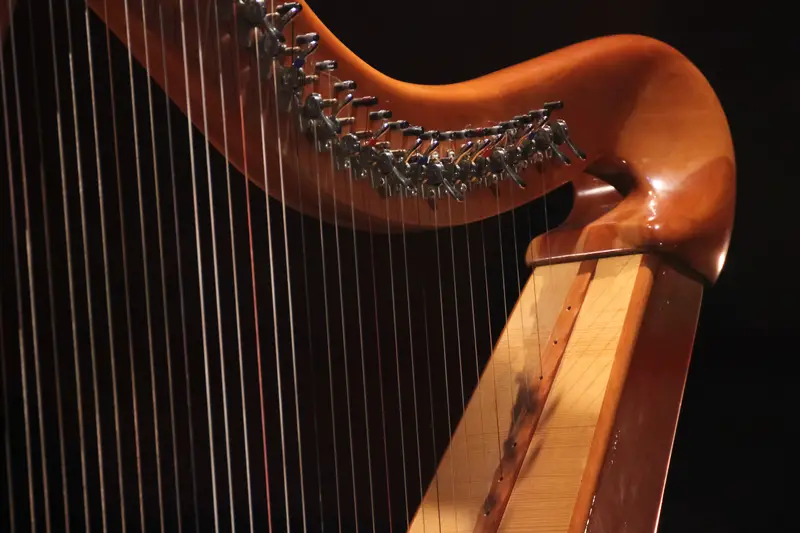It wouldn’t be an exaggeration to say that the harp probably has the most elegant and graceful reputation of all the musical instruments but nothing can ruin that image faster than seeing a dirty and worn out harp. As expected, harps are subjected to the same wear and stress and build-up problems that all other string instruments have. And because harps are a very contact heavy type of instrument, this makes properly keeping your harp clean and beautiful even more important.
The simplest way to clean a harp is to keep it clean. Make a routine of using a very soft cloth to lightly dust the whole instrument after every practice. Focus on and give special attention to the parts that are touched the most like the soundbox, strings, and neck as they attract fingerprints and collect the oils from your hands. For the top of the harp where the strings, tuning pins, and sound discs or sharping levers are located, use a soft-bristled brush or a makeup brush to dust these spots. You can also clean these places more thoroughly when you change out strings.
No matter if you’re just starting to learn how to play or have played your whole life, if your instrument is of beginner quality or hand-crafted for masters, it is important to keep your instrument clean. Not only will it keep your harp looking beautiful, but it will also keep your harp sounding just as beautiful and help to extend its lifespan just a bit longer.
Why Do You Need To Clean Your Harp
 As said before, harps are subject to the same wear and tear that all other instruments are. It just might be a little harder to see on such a big instrument. And despite how solid and strong they look, harps are a lot more delicate than you would think.
As said before, harps are subject to the same wear and tear that all other instruments are. It just might be a little harder to see on such a big instrument. And despite how solid and strong they look, harps are a lot more delicate than you would think.
Unlike other string instruments that use bows on the strings to create sound like the cello or have straps to hang from like the guitar, the harp is solely reliant on contact with the player’s body to remain upright and create music. This contact means that it will absorb the oils and dirt on your body and hands which will, in turn, attract even more oils and dirt.
In the short-run, these oils and dirt can cause the wood to become slippery and hard to hold on to. However, if you don’t properly clean your harp, the oils and dirt can build up and seep into the protective varnish and into the wood and cause much deeper damage to the instrument’s structural integrity and to its beautiful appearance.
Preventative Care And Precautions
One thing you can do to help keep your harp clean and looking like new is to try to prevent any kind of build-ups and to try limiting how much dirt has the opportunity to get on your instrument.
You can do this by washing your hands before you play and making sure that they are properly dried before you begin playing. Additionally, do not put on any kind of moisturizing creams or lotions on your hands before playing. This is not only bad for the strings but they also contain certain oils in them that could seep into your instrument or attract even more dirt and dust.
You should also remove any jewelry that you are wearing that could cause you to inadvertently dent or scratch the strings or varnish. Also be cautious of anything on your clothes that could scratch the instrument like buttons, beads, or sequins. These small scratches are great gathering places for dirt that are harder to fully clean.
Finally, always wipe down the common contact areas of your harp after each practice session. These places include the soundbox, the strings, the neck (if you do a lot of tuning), the sharping levers on a lever harp, and the pedals on a pedal harp.
Deep Cleaning And Cleaning Solutions
If there are problem dirt spots or fingerprints that refuse to come off with a simple wipe-down and dusting of the instrument, you can try using a soft microfiber cloth that has been dampened with warm water to scrub at it a bit more.
Make sure that the cloth is only damp and not wet and that it is warm rather than cold as this will be more effective in getting the dirt off without running the risk of getting your harp too wet. Make sure to properly dry your harp after doing this as excess moisture can seep into your harp and damage it.
For help on very troublesome spots that won’t come off with just warm water, use a mixture of warm water and a few drops of mild dish detergent. Just be sure to apply to your cloth rather than your instrument and dry your instrument afterwards if there’s any moisture that doesn’t evaporate. Also, though you can use them, be careful of cleaning solutions that contain alcohol in them as they could potentially prove corrosive to the varnish on your harp.
No matter what, never use any kind of cleaning solution directly on the soundboard of your harp and be extra careful about getting it wet in any way. It is the most delicate part of your harp and can get damaged easily and is hard to fix.
Polishing Your Harp
 Polishing your harp is a good way to help keep the protective varnish on your instrument strong and able to keep dirt and oils from seeping into the wood. It also keeps your instrument shiny and looking pretty and new.
Polishing your harp is a good way to help keep the protective varnish on your instrument strong and able to keep dirt and oils from seeping into the wood. It also keeps your instrument shiny and looking pretty and new.
There are many different opinions on what types of polishes are best and how often to polish your instrument. While there are most certainly some that are better than others, it all comes down to personal preference. That being said, never use furniture polish on a harp and never apply polish directly to the wood of the instrument, especially on the soundboard.
Most harpists will recommend either Lyon & Healy’s Harp Polish or Harpo Harp & Wooden Musical Instrument Cleaner but some harpists swear by the cheaper SC Johnson Paste Wax as well.
And though there are different opinions on how frequently one should polish their harp, that is also a matter of personal preference. It also depends on how often you use your harp. A general consensus, though, is that for those who regularly practice their harp every day or nearly every day, you should polish your instrument about four times per year. Other opinions have said that polishing it once a year is fine. As stated before, it all comes down to personal preference and how often your particular harp needs it.
When polishing your harp, never apply the polish directly to the wood but rather put a small amount around the size of a dime on a soft cloth and apply that on an area of about one by two feet and rub it in. Repeat this on all of the wood areas of the harp and then wait for the polish dry a bit. After waiting, wipe down the whole instrument to remove any excess polish and rub it down for extra shine.
If there are any gilded areas on your harp, never polish or rub them. Just dust them like normal.
Never Keep Water Near Your Harp
Like most instruments, water and moisture are bad for harps and can severely damage them. Wet wood can become softer and thus less strong and less able to stand the high levels of stress placed on them by the strings. It can also cause the wood to dry badly and become more brittle leading to less flexibility and a higher risk of creating cracks in the wood.
Make sure that you keep water away from your harp whether it be a decorative vase of flowers sitting nearby or a cup or water bottle used for drinking. If you do need a bottle of water to replenish your thirst during practice times as we all sometimes do, make sure that it is in a sealed container and that you never drink while holding your instrument. That is just a bad accident waiting to happen.
Extra Words Of Advice
If you happen to notice very big build-ups on your instrument that you can’t seem to remove through normal methods, consider taking it to a professional for a professional cleaning. Never try experimenting with methods that could potentially damage your instrument. There are people who have studied and trained at those kinds of things.
Consider where you keep your harp and make sure it is not in a place that could cause it to get unnecessarily dirty or where it could easily get damaged. Also, make sure that it is in a stable position when you clean it. It would be bad to drop it and possibly cause irreparable damage when you are only trying to clean it.
As you upgrade your harp, take very good care of it. If you come into possession of a very old or high-quality, or valuable instrument, do not try to do anything more than clean or polish it. Take it to a professional for any additional care it may need as it would be devastating to accidentally damage such an instrument.



